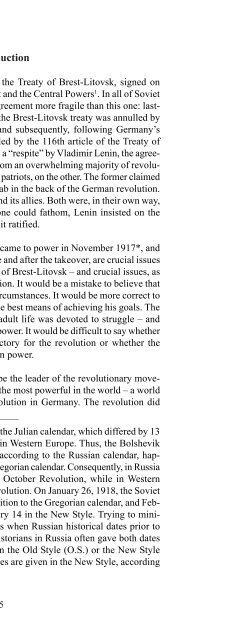Lenin, Trotsky, Germany and the Treaty of Brest-Litovsk The ...
Lenin, Trotsky, Germany and the Treaty of Brest-Litovsk The ...
Lenin, Trotsky, Germany and the Treaty of Brest-Litovsk The ...
You also want an ePaper? Increase the reach of your titles
YUMPU automatically turns print PDFs into web optimized ePapers that Google loves.
Introductionconsequently, <strong>of</strong> a revolution in Europe. <strong>The</strong> <strong>Treaty</strong> <strong>of</strong> <strong>Brest</strong>-<strong>Litovsk</strong>, formedagainst <strong>the</strong> wishes <strong>of</strong> <strong>the</strong> majority <strong>of</strong> <strong>the</strong> revolutionary party, became <strong>the</strong> firstopportunistic step taken by <strong>the</strong> Soviet government.Ironically, it turned out that in order to secure a victory for <strong>the</strong> revolution inRussia, a potential revolution in <strong>Germany</strong> had to be sacrificed – while in order tosecurity a victory for <strong>the</strong> revolution in <strong>Germany</strong>, it might have been necessary tosacrifice Soviet rule in Russia. This was <strong>the</strong> choice represented for <strong>the</strong> Sovietgovernment by <strong>the</strong> <strong>Treaty</strong> <strong>of</strong> <strong>Brest</strong>-<strong>Litovsk</strong> – <strong>the</strong> first clash between <strong>the</strong> interests<strong>of</strong> <strong>the</strong> international revolution <strong>and</strong> <strong>the</strong> need to cement <strong>the</strong> power <strong>of</strong> <strong>the</strong> CommunistParty in Russia.” 7 A peace treaty with <strong>Germany</strong> gave <strong>the</strong> German governmenta certain respite from fighting <strong>and</strong> improved <strong>the</strong> general state <strong>of</strong> <strong>the</strong> country.As <strong>the</strong> Left SRs wrote at <strong>the</strong> time, “<strong>the</strong> formation <strong>of</strong> this peace treaty sloweddown <strong>the</strong> work <strong>of</strong> <strong>the</strong> International: bread from regions occupied by <strong>Germany</strong>reconciled hungry German workers <strong>and</strong> soldiers with <strong>the</strong> German government,” 8while <strong>the</strong> fact that Russia had “thrown itself on <strong>the</strong> mercy <strong>of</strong> <strong>the</strong> winning sidestreng<strong>the</strong>ned German imperialism not only materially, but spiritually as well.” 9By contrast, <strong>the</strong> Soviet government’s refusal to sign a treaty would have worsened<strong>Germany</strong>’s military <strong>and</strong> political situation <strong>and</strong> increased <strong>the</strong> chances for aGerman revolution. This, at least, was <strong>the</strong> view shared by <strong>the</strong> German Communists,on <strong>the</strong> one h<strong>and</strong>, <strong>and</strong> <strong>the</strong> German government, on <strong>the</strong> o<strong>the</strong>r. As early asDecember 1917, German leftists had tried to prevent <strong>the</strong> formation <strong>of</strong> a separatepeace between Russia <strong>and</strong> <strong>Germany</strong>. <strong>The</strong>y distributed a declaration which statedthat any peace negotiations would have a ruinous effect on a likely revolution in<strong>Germany</strong> <strong>and</strong> must be aborted. 10<strong>The</strong> positions <strong>of</strong> Karl Liebknecht, <strong>the</strong> leader <strong>of</strong> <strong>the</strong> German Communists, <strong>and</strong><strong>Lenin</strong>, <strong>the</strong> head <strong>of</strong> <strong>the</strong> Soviet government, were unequal. <strong>The</strong> German Communistsdem<strong>and</strong>ed a revolution in <strong>Germany</strong> for <strong>the</strong> sake <strong>of</strong> a world revolution. <strong>Lenin</strong>stood for <strong>the</strong> preservation <strong>of</strong> <strong>the</strong> Soviet government in Russia at any price, so tha<strong>the</strong> might preserve power in his own h<strong>and</strong>s <strong>and</strong>, in time, come to reign over <strong>the</strong>international Communist movement. 11If Liebknecht did want to save <strong>the</strong> top position in <strong>the</strong> future Comintern for himself,<strong>the</strong>n this did not go against <strong>the</strong> interests <strong>of</strong> <strong>the</strong> European revolution. <strong>Lenin</strong> wasunlucky: by signing <strong>the</strong> <strong>Treaty</strong> <strong>of</strong> <strong>Brest</strong>-<strong>Litovsk</strong> for <strong>the</strong> sake <strong>of</strong> his own power, hedestroyed any chance (however slight it had been) <strong>of</strong> a victory for <strong>the</strong> Communistrevolution in <strong>Germany</strong> <strong>and</strong> in Europe.It was initially believed that <strong>the</strong> Bolsheviks were engaging in peace talks with <strong>the</strong>German government exclusively for <strong>the</strong> purpose <strong>of</strong> propag<strong>and</strong>a <strong>and</strong> in order togain some time, not in order to sign an actual treaty. Liebknecht emphasized thatif <strong>the</strong> negotiations “did not lead to peace in <strong>the</strong> spirit <strong>of</strong> socialism,” it would benecessary “to curtail <strong>the</strong> negotiations, even if <strong>the</strong>ir [<strong>Lenin</strong>’s <strong>and</strong> <strong>Trotsky</strong>’s]9








